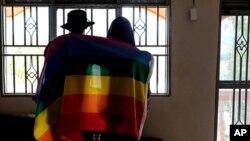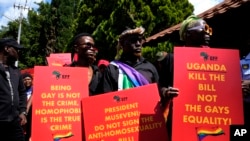ນັກເຄື່ອນໄຫວຂອງບັນດາກະເທີຍ ຫຼື ຊາວເກ (Gay) ຢູ່ໃນປະເທດ ອູການດາ ກໍາລັງດໍາເນີນການຮຽກຮ້ອງໃຫ້ຍົກເລີກກົດໝາຍຕໍ່ຕ້ານການຮັກ ຮ່ວມເພດ ເຊິ່ງໄດ້ເຊັນເປັນກົດໝາຍໃນວັນຈັນວານນີ້ໂດຍປະທານາທິບໍດີ ໂຢເວຣີ ມູເຊເວນີ (Yoweri Museveni). ບັນດານັກວິຈານກ່າວວ່າ ກົດໝາຍ ດັ່ງກ່າວໄດ້ອະນຸມັດໃຫ້ມີການຈໍາຄຸກຄະຫຼອດຊີວິດ ແລະມີການປະຫານຊີວິດໃນ ບາງກໍລະນີ, ເຊິ່ງເປັນກົດໝາຍຕໍ່ຕ້ານພວກກະເທີຍທີ່ມີຄວາມເຂັ້ມງວດ ແລະ ຮຸນແຮງທີ່ສຸດໃນໂລກ. ອົງການນິລະໂທດກໍາສາກົນກ່າວວ່າ ກົດໝາຍດັ່ງກ່າວ ເປັນການລະເມີດຕໍ່ລັດະທໍາມະນູນ ແລະໄດ້ສະແດງຄວາມຫວັງວ່າ ສານຈະປະ ກາດວ່າເປັນສິ່ງຜິດກົດໝາຍ. ຮາລິມາ ອາທຸມານີ (Halima Athumani) ມີລາຍງານເລື້ອງນີ້ຈາກນະຄອນຫຼວງກໍາປາລາ, ເຊິ່ງ ທິບສຸດາ ມີລາຍລະອຽດ ມາສະເໜີທ່ານໃນອັນດັບຕໍ່ໄປ.
ການເຊັນລົງນາມຂອງປະທານາທິບໍດີ ມູເຊເວນີ ກົດໝາຍຕໍ່ຕ້ານການຮັກຮ່ວມ ເພດປີ 2023 ໃນວັນຈັນວານນີ້ ໄດ້ເຮັດໃຫ້ບັນດາສະມາຊິກປະຊາຄົມ LGBTQ ຂອງປະເທດອູການດາ ມີຄວາມຕົກໃຈຫຼາຍທີ່ສຸດ.
ກົດໝາຍໃໝ່ນີ້ໄດ້ປະກາດວ່າ ຈະຂັງຄຸກຜູ້ທີ່ມີການສົ່ງເສີມການຮັກຮ່ວມເພດ ເປັນເວລາ 20 ປີ, ແລະ ຂັງຄຸກຕະຫຼອດຊີິວິດຕໍ່ຜູ້ທີ່ຖືກຕັດສິນວ່າ ມີການຮັກ ຮ່ວມເພດ.
ກົດໝາຍດັ່ງກ່າວນີ້ຍັງໄດ້ກໍານົດໂທດປະຫານຊີວິດ ສໍາລັບສິ່ງທີ່ພວກເຂົາຮ້ອງ ວ່າ “ເຮັດໃຫ້ການຮັກຮ່ວມເພດນັ້ນຮ້າຍແຮງຂຶ້ນ,” ເຊິ່ງລວມມີ ການມີເພດສໍາ ພັນກັບຜູ້ຄົນຈັດຢູ່ໃນກຸ່ມທີ່ມີຄວາມສ່ຽງລວມມີ ບັນດາຜູ້ອາວຸໂສ ແລະ ເດັກ ນ້ອຍ.
ປະຊາຊົນຊາວອູການດາຫຼາຍໆຄົນ ທີ່ບໍ່ໄດ້ລາຍງານກ່ຽວກັບກໍລະນີຕ່າງໆ ຈະຕ້ອງຮັບຜິດຊອບດ້ວຍການຈໍາຄຸກເປັນເວລາ 5 ປີ ຫຼື ເສຍຄ່າປັບໄໝເປັນ ຈໍານວນເງິນ 10 ລ້ານຊີລລິງ (ປະມານ 2,680 ໂດລາ).
ພ້ອມກັນນັ້ນ, ບັນດານັກຂ່າວ ແລະ ອົງການຂ່າວອື່ນໆຈະປະເຊີນ ກັບການຈໍາ ຄຸກ 5 ປີ ຖ້າພວກເຂົາເຈົ້າເປີດເຜີຍຂໍ້ມູນຂອງຜູ້ເຄາະຮ້າຍຈາກການຮັກຮ່ວມ ເພດໂດຍບໍ່ໄດ້ຮັບການອະນຸຍາດຈາກສານ ຫຼືບຸກຄົນດັ່ງກ່າວ.
ທ່ານເອຣິກ ເອັນດາວູລາ (Eric Ndawula) ເປັນຜູ້ອໍານວຍການໃຫຍ່ຂອງສູນ ສົ່ງເສີມພະລັງໄວໜຸ່ມ Lifeline, ເຊິ່ງເປັນອົງການທີ່ບໍ່ຂຶ້ນກັບລັດຖະບານ ທີ່ສະ ໜອງການສະໜັບສະໜຸນໃຫ້ແກ່ປະຊາຊົນຊາວ ອູການດາ ທີ່ເປັນກະເທີຍ, ເປັນຜູ້ຮັກຮ່ວມເພດ ຫຼື ຮັກເພດດຽວກັນໃນນະຄອນຫຼວງກໍາປາລາ. ທ່ານບອກ ກັບ VOA ວ່າຊຸມຊົນຊາວ LGBTQ ກໍາລັງຢ້ານກົວຕໍ່ສິ່ງທີ່ຈະເກີດຂຶ້ນໃນຕໍ່ ໜ້າ, ເຊິ່ງທ່ານກ່າວວ່າ:
“ເວົ້າແທ້ໆ ຂ້ອຍມີຄວາມຢ້ານກົວຫຼາຍ. ມັນມີການຄາດການໄວ້, ແຕ່ມັນເກີດ ຂຶ້ນໃນທັນທີທັນໃດໃນມື້ເຊົ້ານີ້ ຄືວ່າຕື່ນມາຍ້ອນຂ່າວດັ່ງກ່າວນີ້. ພວກເຮົາຍັງ ຄົງເຮັດວຽກຮ່ວມກັນສໍາລັບການການຫາລືກ່ຽວກັບຄວາມເທົ່າທຽມກັນ ເພື່ອເບິ່ງ ອີກບາດກ້າວນຶ່ງໃນຕໍ່ໜ້າ. ແຕ່ຂ່າວດັ່ງກ່າວນັ້ນ ໄດ້ເຮັດໃຫ້ພວກເຮົາຕົກໃຈ ຫຼາຍ.”
ໃນເດືອນເມສາແລ້ວນີ້, ລັດຖະສະພາ ໄດ້ຜ່ານຮ່າງຍັດຕິ ກ່ຽວກັບ ການຕໍ່ຕ້ານ ການຮັກຮ່ວມເພດ ເຊິ່ງມີການລົງມະຕິດ້ວຍຄະແນນ 341 ຕໍ່ 1 ສຽງ.
ຢູ່ໃນຖະແຫຼງການທີ່ອອກມາໃນວັນຈັນວານນີ້, ໂຄສົກຂອງລັດຖະສະພາ ທ່ານນາງ ອານິຕາ ອາມົງ ກ່າວວ່າ ບັນດາສະມາຊິກສະພາເອົາໄດ້ໃຈໃສ່ຕໍ່ ຄວາມກັງວົນຂອງປະຊາຊົນຊາວອູການດາ ແລະ ໄດ້ອອກກົດໝາຍເພື່ອປົກປ້ອງສິນທໍາຂອງຄອບຄົວ.
ໃນນັ້ນເຂົາເຈົ້າໄດ້ຮຽກຮ້ອງບັນດາເຈົ້າໜ້າທີ່ໃຫ້ບັງຄັບໃຊ້ກົດໝາຍ ໃນອັນທີ່ ທ່ານນາງຮ້ອງວ່າເປັນຄວາມຍຸຕິທໍາ, ໝັ້ນຄົງ ແລະມີລັກສະນະທີ່ໜັກແໜ້ນ.
ອົງການນິລະໂທດກໍາສາກົນໄດ້ອະທິບາຍວ່າ ກົດໝາຍດັ່ງກ່າວມີຄວາມເຂັ້ມ ງວດ ແລະໄດ້ກ່າວວ່າ ພວກເຂົາເຈົ້າຫວັງວ່າກຸ່ມສິດທິມະນຸດຂອງຊາວ ອູການດາ ຈະສົ່ງເສີມໃຫ້ມີການຍົກເລີກກົດໝາຍດັ່ງກ່າວນີ້.
ທ່ານໂຣແລນ ເອໂບເລ (Roland Ebole), ເຊິ່ງເປັນນັກຄົ້ນຄວ້າກ່ຽວກັບ ພູມິພາກ ຂອງອົງການນິລະໂທດກໍາສາກົນ ກ່າວກັບ VOA ຜ່ານໂທລະສັບ ວ່າ:
“ພວກເຮົາຫວັງວ່າ ພວກເຮົາຈະຍັງຄົງດໍາເນີນງານຮ່ວມກັບກຸ່ມສິດທິມະນຸດ ເພື່ອຜັກດັນ ຫຼືຮຽກຮ້ອງ, ໂດຍສະເພາະຕໍ່ບັນດາສະມາຊິກສະພາ ເພື່ອຍົກ ເລີກກົດໝາຍທີ່ເປັນຕາລັງກຽດນີ້. ຂ້າພະເຈົ້າຮູ້ວ່າ ທາງເລືອກທີສອງເບິ່ງຄືວ່າ ຈະເປັນໄປບໍ່ໄດ້ ເມື່ອພິຈາລະນາເບິ່ງວ່າມັນຖືກຮັບຜ່ານໂດຍສຽງສ່ວນຫຼາຍ, ສະນັ້ນ ບາງທີຄວາມຫວັງຂອງພວກເຮົາໃນຂະນະນີ້ອາດຈະແມ່ນສານ. ສານດັ່ງກ່າວນີ້ຈະກວດເບິ່ງກົດໝາຍດັ່ງກ່າວ ແລະເຫັນວ່າມັນເປັນການລະເມີດ ຕໍ່ສິດທິມະນຸດ.”
ອົງການສາກົນຕ່າງໆທີ່ດໍາເນີນງານຢູ່ໃນປະເທດອູການດາເຊັ່ນ ອົງການ UNAIDS ແລະອົງການ USAID ໄດ້ກ່າວໄປກ່ອນໜ້ານັ້ນວ່າ ການຜ່ານ ຮ່າງກົດໝາຍກ່ຽວກັບການຕໍ່ຕ້ານການຮັກຮ່ວມເພດ ບໍ່ພຽງແຕ່ຈະເຮັດໃຫ້ການ ປະຕິບັດງານຂອງພວກເຂົາເຈົ້າຢູ່ໃນ ອູການດາ ມີຄວາມຊັບຊ້ອນເທົ່ານັ້ນ, ແຕ່ຈະຕ່າວປີ້ນຜົນປະໂຫຍດທີ່ ອູການດາ ໄດ້ເຮັດໃນການຕໍ່ສູ້ຕ້ານເຊື້ອໄວຣັສ HIV/AIDS ອີກດ້ວຍ.
Gay activists in Uganda are calling for a repeal of the Anti-Homosexuality Act signed into law Monday by President Yoweri Museveni. Critics say the law, which allows life imprisonment and the death penalty in some cases, is draconian and the world’s harshest anti-gay law. Amnesty International says the act is a violation of the constitution and expressed hope the courts will declare it illegal. Halima Athumani has the story from Kampala, Uganda.
President Museveni’s signing of the Anti-Homosexuality Act of 2023 on Monday has left members of Uganda’s LGBTQ community in shock.
The new law calls for up to 20 years in prison for promoting homosexuality and life imprisonment for anyone convicted of homosexuality.
The law also imposes a death penalty for what it calls “aggravated homosexuality.”
This includes having sex with people categorized as vulnerable, including the elderly and children.
Any Ugandan who does not report such cases is liable on conviction to spend five years in prison or pay a fine of 10 million Ugandan shillings, about $2,680.
Also, journalists and other media figures will face five years in prison if they disclose the identity of a homosexual victim without the authority of the court or that person.
Eric Ndawula is executive director of the Lifeline Youth Empowerment Center, an NGO in Kampala that provides support to Ugandans who are gay, bisexual or queer. He tells VOA that the LGBTQ community is frightened over what will come next.
NDAWULA ACT, English
“I am very scared honestly. It was expected, but it came very abrupt this morning to just wake up to such news. We are still working together as a convening for equality to see our next step forward. But the news has just shocked us.”
In April, parliament passed the Anti-Homosexuality Act on a vote of 341 to 1.
In a statement Monday, parliament speaker Anita Among said lawmakers heeded the concerns of Ugandans and legislated to protect the sanctity of the family.
Among urged authorities to enforce the law in what she called a fair, steadfast and firm manner.
Amnesty International has described the law as draconian and says it hopes that Ugandan rights groups will advocate for its repeal.
Roland Ebole, Amnesty International’s regional researcher, spoke to VOA via phone.
EBOLE ACT, English
“We hope that we will continue working with rights groups to push or challenge, especially parliamentarians, to repeal this abhorrent law. I know the second option is very unlikely considering that this was passed by a very large majority, so perhaps our hope right now is the court. That the court will actually look at this law and see that it is a violation on human rights.”
International bodies that operate in Uganda, such as UNAIDS and USAID, have previously stated that the passing of the Anti-Homosexuality Act will not only complicate their work in Uganda, but reverse the gains made by Uganda in the fight against HIV/AIDS.






